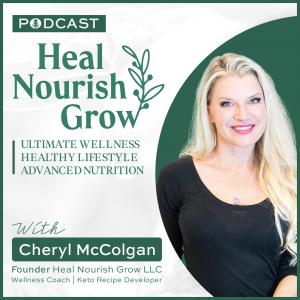Heal Nourish Grow Podcast

Hormone Health Tips with a Functional Medicine Doctor
In this episode, Dr. Malaika Woods discusses her journey from traditional obstetrics to functional medicine. She is now focused on the importance of understanding hormones for optimal health. She shares insights on personal weight loss journey, the mental aspects of maintaining a healthy lifestyle, and the common hormonal issues women face, particularly during menopause. Dr. Woods also explains the significance of hormone replacement therapy, different methods of administration, and the importance of testosterone for both women and men. You can find Dr. Woods at her website, https://drwoodswellness.com/ Takeaways Weight loss is easier than maintenance; mental aspects are crucial. Nutrition, stress management, and inflammation are key pillars of health. Women often experience hormonal changes in their 40s and 50s. Hormone replacement therapy can reduce risks of various diseases. Bioidentical hormones are preferred for their safety and efficacy. Testosterone is vital for women's health and often overlooked. Men also experience low testosterone, impacting their health significantly Watch on YouTube https://youtu.be/6STrr4xFR8A Episode Transcript Cheryl McColgan (00:01.111)Hi everyone, welcome to the Heal Nourish Grow podcast. Today I have Dr. Malekah Woods and she is a specialist in women's health. She talks a lot about hormones and she also sees men patients. So if you're a man, don't click away. Plus you need to know this stuff about women's health as well. So all that being said. Dr. Malaika Woods (00:17.592)Bye. Cheryl McColgan (00:19.428)Welcome Dr. Woods. I would love if you could share with people a little bit about your background. How did you come to this line of work and any personal health and wellness thing that speaks to why you're so passionate about this now. Dr. Malaika Woods (00:32.175)Absolutely. Thanks for having me, Cheryl. So just to give you kind of a brief synopsis of my background, I actually wanted to deliver babies back in eighth grade. So that's how it all started. ended up being fast forward to 2011. I was a full -time OB -GYN and a very busy practice. I was a year out from having my second kid and seeing 30, 40 people a day. It was supposed to be the ideal job, but I was stressed out. I was a mother with, you know, a five -year -old and a one -year -old. And I was overweight. I was about 240 pounds and I knew I needed to do something different with my own health. And so that was my first step into looking at something other than traditional obstetrics and gynecology, which is what I'm board certified in. So my first journey was weight loss and I actually got board certified in obesity medicine. And over the course of 2011 to 2013, I lost 60 pounds. I tried a lot of different things and we may get into some of that down the road. And then I learned about bioidentical hormones. And I thought, wow, I'm an OB -GYN, but I don't really know anything about bioidentical hormones. And so I got certified in BHRT, bioidentical hormones for short. And then I learned about functional medicine. And all of this happened in a short span of time, probably around 2011 to 2014. And when I learned that functional medicine was about root cause approaches and natural solutions, I was like, okay, wow, this is what I've been missing all along. And so functional medicine is now what I do. It is the umbrella under which I offer those other services, whether it's hormone optimization, weight loss, thyroid support, a lot of different things, but that's kind of what brought me to where I am today. Cheryl McColgan (02:11.612)my gosh, I get so excited when I talk to health professionals like yourself that are really going away from sort of the traditional paradigm of just, you know, fix it with a pill or something and where it's really like a whole systems approach and, you know, getting to the root cause with functional medicine. Do you think that,






 Visit Podcast Website
Visit Podcast Website RSS Podcast Feed
RSS Podcast Feed Subscribe
Subscribe
 Add to MyCast
Add to MyCast